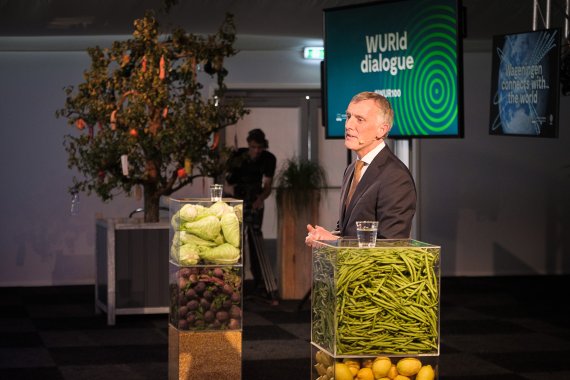©Guy Ackermans
During the WURld Dialogues, Rector Magnificus Arthur Mol debated with alumni and experts from China, Ethiopia, Latin America and the United States who were linked up to the campus live stream. They discussed the challenge of the global food supply.
Since most megacities are currently developing in developing countries, the availability of food is the first concern for the tens of millions of city dwellers. ‘The population in my city is growing by 7 per cent every year’, stated alumnus Laurant Sedogo. ‘Meanwhile, less land is becoming available for agricultural production. There is a great need to improve the productivity and infrastructure in the food chains’, said the former agriculture minister from Burkina Faso, who addressed an audience in the Ethiopian capital Addis Ababa.
Nutritional Value
Food security is no longer the biggest challenge in China, according to Professor Chun-Ming Liu, speaking from Nanjing. China has managed to feed 21 per cent of the world’s population on 7 per cent of the world’s agricultural land, mainly through production increases and plant breeding, Liu said, but now it’s about improving nutritional value.
Food Deserts
That nutritional value is under pressure, now that worldwide more people are obese than hungry. An important culprit is processed food, the consumption of which has tripled in the last twenty years. This processed food, containing a lot of sugar, fat and salt, is now creating food deserts in the United States, said Martien van Nieuwkoop, Director of Agriculture at the World Bank. ‘The rich part of the American population buys expensive organic food, but a large part of the lower and middle-income families does not have access to fresh vegetables. They live in so-called food deserts.’
Obesity
Speaking from Colombia, Ruben Echeverria showed links between agriculture, obesity and inequality. ‘Why is food cheaper in the Netherlands than in Latin America? And why is there less obesity in the Netherlands? Because Latin America has invested too much in export and too little in food farming and combatting inequality.’
Sugar Tax
Echeverria advocated a tax on sugar to reduce obesity. ‘That works very well in Mexico, where the tax was introduced five years ago. The sugar consumption is now decreasing.’ A food fat tax might also help, according to the director of the CIAT agricultural research institute. In the US, this is a controversial subject, Van Nieuwkoop responded. A tax would affect the poor population – those who already eat little fresh food. He suggested that perhaps it would be better to abolish subsidies on sweeteners in the US – 20 billion dollars a year for maize sweeteners.
Variation
From Wageningen, Rector Arthur Mol suggested an alternative for the sugar tax. ‘You do not have to burden the consumer; you could also impose a sugar tax on the food producers. England introduced this in April. This leads to more innovations because it pays to use healthier substitutes for sugar and fat in food.’ Another interesting option was suggested in the hall of the Wisdom and Wonder Pavilion on the campus: why not give a tax exemption on fruit and vegetables to promote healthy food?
Food Waste
The speakers from the five continents also talked about reducing food waste. In developing countries, a lot of food is wasted on and around the farm; in richer countries consumers and retailers waste most of all. In China, a government campaign is now underway to persuade consumers to reduce portion sizes and eat enough to prevent waste. That works.
According to Van Nieuwkoop, American consumers spend an average of 1,500 euros a year on food that they then throw away. So there is a lot to be gained. He thinks that the big food companies can make an important contribution to counteract waste, by embracing the UN’s sustainable development goals. Echeverria also sees a major role for the business community – ‘agriculture is business’ – but governments must challenge the companies to reduce waste. City CouncilsWe must develop circular food systems to reduce food waste, asserted Mol. In doing so, companies should not use the food residues for low-value applications, such as bio-energy, too quickly; they should first look at higher-value applications such as bioplastics and animal feed. Good business models are necessary, but so are design studios. Echeverria pleaded for city food councils to redesign the food supply in the megacities.

